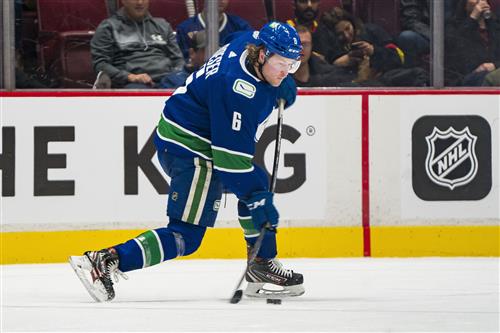
The NHL's 2022 signing period for restricted and unrestricted free agents (UFA) begins July 13. Fans and pundits will be focused on the destinations for the top UFA talent, but noteworthy restricted free agents (RFA) could also change teams via offer sheets.
Under that scenario, a rival club signs another player's RFA to the principal terms of a contract, including length and compensation. The player must give his team notice of the agreement, allowing it seven days to match the deal. If the team refuses, the player then joins his new club and his former team receives a predetermined number of draft picks as compensation based on the financial terms of the offer sheet.
Offer sheets are rarely signed because they are often matched, but there have been two recent instances featuring opposing results.
The most recent saw the Carolina Hurricanes sign Jesperi Kotkaniemi away from the Montreal Canadiens last August with a one-year, $6.1 million contract. The other occurred in July 2019 when the Hurricanes matched a five-year, $42.27 million offer sheet signed by Sebastian Aho with the Canadiens.
It's still many months until the free-agent period begins, and it's difficult to determine which teams could go the offer-sheet route. Nevertheless, the Kotkaniemi signing could inspire an enterprising general manager with plenty of salary-cap space to consider this option if they cannot find what they're seeking through trades or the UFA market.
A number of talented players are slated to become RFAs this summer. Most will likely re-sign. A handful, such as the Vancouver Canucks' Brock Boeser, could be tempting offer-sheet targets, especially with next season's salary rising by just $1 million to $82.5 million.
Here's a look at five restricted free agents who could receive offer sheets after the free-agent market begins and the reasons they could be targeted.
Brock Boeser, Vancouver Canucks
A gifted offensive winger, Brock Boeser has had an immediate positive effect upon the Vancouver Canucks since he joined them for nine games late in the 2016-17 season. Though injuries have limited him to playing just one full NHL season, the 24-year-old's stick-handling skills and lethal shot could draw attention this summer from rival clubs in need of a first-line scorer.
Including his rookie campaign in 2017-18, Boeser has eclipsed the 20-goal plateau three times and netted 45-plus points four times. He led the Canucks in scoring when he finished second in the Calder voting and in 2020-21. With 11 goals and 22 points in 37 contests, he's fifth among their scoring leaders this season. He's also their leader in total goals (105), assists (122) and points (227) since his rookie campaign.
Boeser is completing a three-year contract, which carries a $5.88 million average annual value and arbitration rights this summer. He's earning $7.5 million in actual salary this season, so it'll cost the Canucks that much just to keep the right to match an offer sheet. He could seek a substantial raise after teammates Elias Pettersson ($7.35 million AAV for three years) and Quinn Hughes (six years, $7.85 million AAV) signed lucrative contracts last summer.
The Canucks, however, have $71.4 million invested in just 13 players for 2022-23. They're also under new management this season, and this front office could have different ideas about Boeser's value. Re-signing him will prove challenging unless they can shed sufficient cap space. A rival GM could attempt to pry him away with a multiyear deal worth over $8.5 million annually.